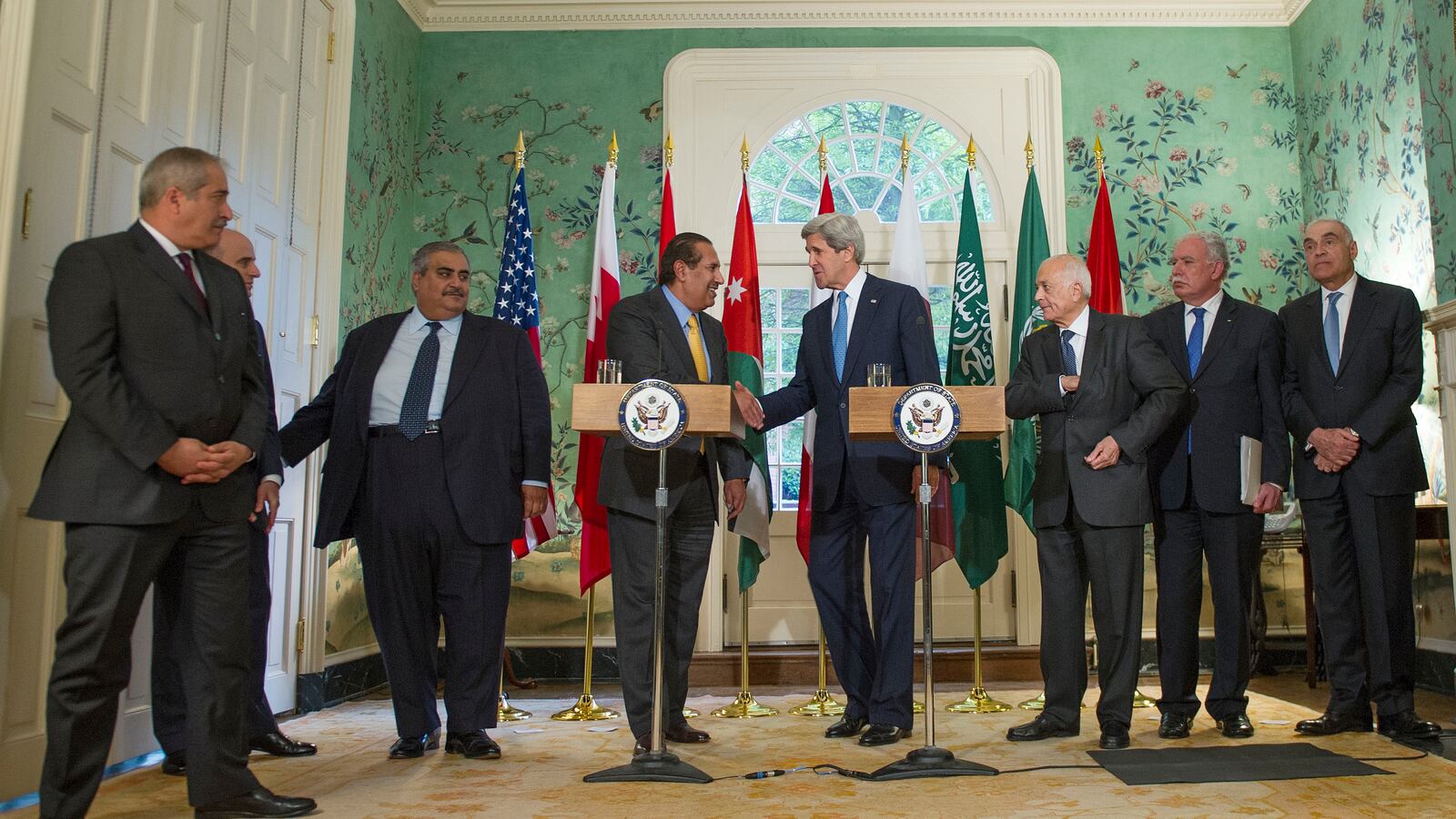Prominent international media outlets are reporting today that a meeting between John Kerry and Mahmoud Abbas, which took place on Tuesday in Amman, might lead to talks about having talks about resuming negotiations between Israelis and Palestinians. The New York Times's report leads with the Arab League's backing for Kerry's new initiative, but for Haaretz the important news is that Kerry plans to announce on Friday that a resumption of negotiations will be based on the 1967 borders.Meanwhile, Netanyahu spokesman Mark Regev immediately called Reuters to deny a report that the prime minister was now willing to enter negotiations predicated on recognition of the 1967 borders. Netanyahu has long been adamant that the 1967 lines were “indefensible” and would not accept them as parameters for talks.

Otherwise, there has been no response from the prime minister's office regarding Kerry's efforts to revive Israeli-Palestinian negotiations, which have been comatose for about two years.
Over dinner Tuesday night I asked two friends who specialize in Middle East analysis—one employed by a media outlet and the other by a think tank—what they thought about the Kerry-Abbas meeting. One responded with a dramatic, exaggerated yawn. The other snickered. And they are not alone in their indifference to this latest round of shuttle diplomacy. One would be hard-pressed to find any serious Middle East analyst who regards the secretary of state's Amman trip as substantive or meaningful.
Even the State Department played down expectations ahead of the meeting. With less than three hours left before Kerry's scheduled departure on Tuesday, a spokesperson told AP correspondent Matt Lee that Abbas had not yet confirmed it would take place. S/he added that “it would not be accurate” to say that the purpose of Kerry's trip was to get Abbas and Netanyahu back to the negotiating table.
In Israel, the media was focused on the European Union's new guidelines regarding its dealings with Israeli institutions that maintain interests in the occupied territories. Officially called a Commission Notice, the guidelines caused an uproar across the political spectrum, with approval from the left and condemnations from the center rightward. For the first time in a long while, the occupation led the domestic news cycle, with strong statements from politicians, including Netanyahu.
There has been some speculation that Kerry worked behind the scenes with the Europeans on getting the guidelines passed, as a means of rousing Israel from its apathy regarding the status quo of the 46-year-old occupation. In April the newly appointed secretary of state noted that the window on the two-state solution would close within two years. Specifically, he said: "I think we have some period of time—a year to year-and-a-half to two years, or it's over." The spokesperson referenced Kerry's statement at Tuesday's briefing, noting that the “Secretary has said, of course, time is not unlimited here. It is time to make tough choices.” But Netanyahu has given no indication that he is interested in making concessions of any kind.
Netanyahu's response to the guidelines on the occupied territories was defiant and populist. Israel, he said, “will not accept any foreign directives regarding its borders.” Not even the borders defined by international law, it seems. The Israeli prime minister's statement plays well to the mainstream Israeli narrative, with its theme of being unjustly singled out and bullied.
But Kerry seems to be subtly reminding Israel of its growing diplomatic isolation, as a means of pushing them toward the negotiating table. And it looks as though the Israelis have understood the message. According to Haaretz, Peres linked Kerry's “progress” in restarting negotiations to his call for the E.U. to hold off on publishing its guidelines, which he called “irresponsible sanctions that will sabotage peace negotiations.”
But my dinner companions were probably right to be scornful of Kerry's latest round of Middle East shuttle diplomacy, because there really is nothing new here—just a lot of talk. Of course the Arab League gave Kerry its backing. The League offered far more in 2002, with a peace initiative that proposed full recognition and normalization for Israel in exchange for a withdrawal from all the territories conquered in 1967. Israel never responded to that offer. And now we have Netanyahu's spokesman issuing a denial about Netanyahu's willingness to predicate talks on acceptance of the 1967 boundaries—on the very same day that Kerry announced progress in getting the parties on the same page.
Even if, by some miracle of miracles, Kerry could get Netanyahu and Abbas's negotiating teams to reach an agreement, it would need Hamas's approval. A two-state solution that does not include the 1.5 million Palestinians living in Gaza is meaningless. And if Abbas tried to push through an unpopular agreement that did not include Gaza, he would lose the little credibility he has left.
What we have here is a very sad state of affairs, with all the parties going through the motions of diplomacy in order to give the appearance of momentum. But what they are really doing is maintaining the status quo. Neither Abbas nor Netanyahu has a compelling reason to pay the high cost of compromise. Kerry, meanwhile, cannot afford the appearance of having given up.






